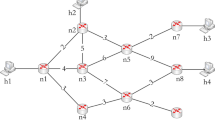Abstract
Multicast routing research efforts have mostly focused on supporting the host-group model in which multicast packets are addressed to a host (or multicast) group. Another multicast routing approach uses multi-destination addressing, where a multicast packet carries a list of the unique (unicast) addresses of all the group members. This form of routing can be accomplished using limited or no additional state beyond the existing unicast routing tables. It, therefore, scales well with the number of multicast sessions but does not scale well with the size of the multicast group and, in fact, requires the size of the multicast group to be below a certain threshold. In this paper, we envision a future scenario in which both host-group and multi-destination addressing routing approaches coexist within the Internet. We develop a dynamic routing context for this future scenario wherein a multicast session can adapt among different routing configurations depending on the number of multicast group members and how this number changes over time. We consider three routing options: (1) A single multi-destination addressed flow – suitable for small-group sessions, (2) multiple multi-destination addressed flows – suitable for medium-group sessions and (3) a single host-group addressed flow – suitable for large-group sessions. For multicast sessions that vary in group membership over time, different routing protocols may be best at different points in time. Our work is concerned with the development and evaluation of protocols that allow a multicast session to dynamically switch among these three routing options as the size of the session changes.
Similar content being viewed by others
References
L. Aguilar, Datagram routing for Internet multicasting, in: SIGCOMM (1984) pp. 58–63.
K. Almeroth and M. Ammar, Mlisten: Capturing and analyzing participant behavior in MBone audio sessions, in: Proceedings of the 5th IEEE International Symposium on High Performance Distributed Computing, Syracuse, NY (1996).
S. Bhattacharyya et al., A framework for source-specific IP multicast deployment, IETF draft-bhattach-pim-ssm-00 (2000).
R. Boivie and N. Feldman, Small group multicast, IETF draft-boivie-sgm-01 (2000).
R. Boivie et al., Explicit multicast (Xcast) basic specification, IETF draft-ooms-xcast-basic-spec-02.txt (2001).
K. Calvert, M. Doar and E. Zegura, Modeling Internet topology, IEEE Communications Magazine 33(6) (1997) 160–163.
R. Chalmers and K. Almeroth, Modeling the branching characteristics and efficiency gains of global multicast trees, in: INFOCOM (2001).
J. Chuang and M. Sirbu, Pricing multicast communications: A cost based approach, Telecommunication Systems 17(3) (2001) 281–297.
Y. Dalal and R. Metcalfe, Reverse path forwarding of broadcast packets, Communications of the ACM 21(12) (1978) 1040–1048.
D. Estrin et al., Protocol independent multicast – Sparse mode, RFC 2362 (1998).
W. Fenner, Internet group management protocol, version 2, RFC 2236 (1997).
NS2, http://www.isi.edu/nsnam/ns (2004).
G. Phillips and S. Shenker, Scaling of multicast trees: Comments on the Chuang–Sirbu scaling law, in: SIGCOMM (1999).
M. Sola, M. Ohta and T. Maeno, Scalability of Internet multicast protocol, in: Internet Networking (1998).
D. Waitzman, C. Partridge and S. Deering, Distance vector multicast routing protocol, RFC1075 (1988).
T. Wong and R. Katz, An analysis of multicast forwarding state scalability, in: Internat. Conf. on Networks Protocols (2000).
Xcast, http://www.xcast.jp, also see http://www.alcatel.com/xcast (2004).
Author information
Authors and Affiliations
Corresponding author
Rights and permissions
About this article
Cite this article
He, Q., Ammar, M. Dynamic Host-Group/Multi-Destination Routing for Multicast Sessions. Telecommun Syst 28, 409–433 (2005). https://doi.org/10.1007/s11235-004-5580-1
Issue Date:
DOI: https://doi.org/10.1007/s11235-004-5580-1




